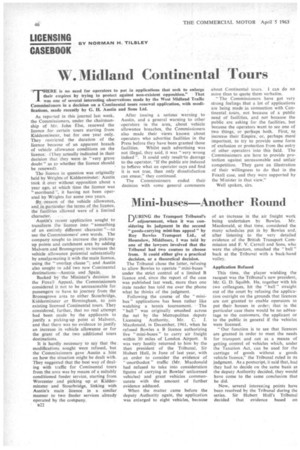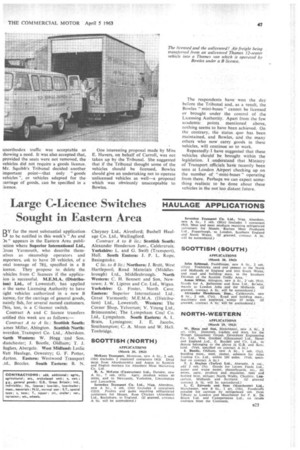Mini-buses—Another Round
Page 48

Page 49

If you've noticed an error in this article please click here to report it so we can fix it.
DURING the Transport Tribunal's adjournment, when it was considering its judgment in the second
"goods-carrying mini-bus appeal" by Roy Bowles Transport Ltd., of Hounslow, Middlesex, I was told by one of the lawyers involved that the Tribunal had two courses to choose from. It could either give a practical decision, or a theoretical decision.
The Tribunal chose the latter, refusing to allow Bowles to operate " mini-buses " under the strict control of a limited B licence and, since the report of the case was published last week, more than one irate reader has told me over the phone what he thinks of the judgment.
Following the course of the " minibus " applications has been rather like watching a tennis tournament. The "
ball" was originally smashed across the net by the Metropolitan deputy Licensing Authority, Mr. C. J. Macdonald, in December, 1961, when he refused Bowles a B licence authorizing five "mini-buses" to carry air freight within 30 miles of London Airport. It was very hastily returned to him by the then president of the Tribunal, Sir Hubert Hull, in June of last year, with an order to consider the evidence of "unorthodox" traffic (Mr. Macdonald had refused to take into consideration figures of carrying in Bowles' unlicensed vehicles) and grant vehicles commensurate with the amount of further evidence adduced.
When the matter came before the deputy Authority again, the application was enlarged to eight vehicles, because
of an increase in the air freight work being undertaken by Bowles. Mr. Macdonald, at that time; considered the many schedules put in by Bowles and, after listening to the very detailed evidence of the British Transport Commission and F. V. Carroll and Sons, who were the objectors, smashed the " ball " back at the Tribunal with a back-hand volley.
Application Refused This time, the player wielding the racquet was the Tribunal's new president, Mr. G. D. Squibb. He, together with his two colleagues, hit the "ball" straight out of the court by refusing the application outright on the grounds that licences are not granted to enable operators to put their houses in order; that in the particular case there would be no acKantage to the customers, the applicant or to the public in general if the vehicles were licensed.
"Our function is to see that licences are granted in order to meet the needs for transport and not as a means of getting control of vehicles which, under the Taxation Act, can be used for the carriage of goods without a goods vehicle licence," the Tribunal ruled in its judgment. As a postscript, it said that, had they had. to decide on the same basis as the deputy Authority decided, they would have come to the same conclusion that he did.
Now, several interesting points have been resolved by the Tribunal during the series. Sir Hubert Hull's Tribunal decided that evidence based on unorthodox traffic was acceptable as thawing a need. It was also accepted that, provided the seats were not removed, the vehicles did not require a goods licence.. Mr. Squibb's Tribunal decided another important point—that only " goods vehicles ", or vehicles adapted for the :arriage of goods, can be specified in a .icence. One interesting proposal made by Miss E. Havers, on behalf of Carroll, was not taken up by the Tribunal She suggested that if the Tribunal thought some of the vehicles should be licensed, Bowles should give an undertaking not to operate unlicensed vehicles as well—a proposal which was obviously unacceptable to Bowles. The respondents have won the day before the Tribunal and, as a result, the Bowles "mini-buses" cannot be licensed or brought under the control of the Licensing Authority. Apart from the few academic points mentioned bove, nothing seems to have been achieved. On the contrary, the status quo has been maintained, and Bowles, and the many others who now carry goods in these vehicles, will continue so to work.
Repeatedly.! have suggested that these vehicles should be brought within the legislation. "understand that .Ministry of Transport officials have recently been seen at London Airport checking up on the number of " mini-buses " operating from there. Perhaps we can expect some-. thing realistic to be done about these vehicles in the not too distant future.








































































































































